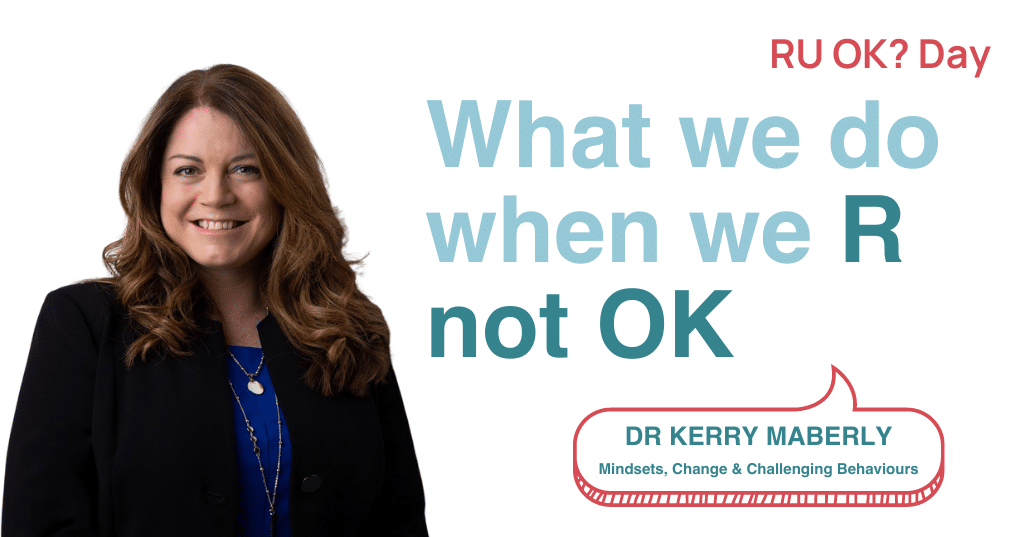Eating, Drinking & Binge Watching TV: What we do when we R not OK…

Annually, RU OK? day rolls around and there are many positive intentions from organisations and individuals to check in with others. We want to let others know that we are here for them, that they are not alone and that there is a willing, caring human being, happy to connect and listen to them.
For many people, 2020 and beyond has been such a testing period. Little or no income or business security, financial stressors, fewer re-employment prospects and of course, health concerns. Social isolation has brought less physical touch in our lives, lockdowns leading to less fresh air and feeling cooped up, and a reduced ability to exercise in ways we might usually enjoy.
By all accounts it has been, for many people, one of their most intense years.
Many of us have not been and may still not be OK. Many are coping, surviving and just getting by. It’s time that we looked at the idea that it’s ok to not be ok. You are not a failure if you haven’t been thriving and living your best life. You are not unsuccessful because you haven’t been as resilient as you previously thought you were. You are a person who has experienced directly or vicariously, conditions that have stretched or exceeded your resources. Nothing more, nothing less.
It is normal to feel a range of emotions – it’s how long we hang out in negative emotional states that can lead to problematic habits. 2020 has provided a perfect environment for a slide into negative emotional and behavioural habits. Too tired or feeling down, you might grab takeaway rather than preparing fresh food. Feeling low and uncertain about the future, you grab a glass (or bottle) of wine and instantly feel a glimmer of something positive. Social plans have been cancelled, so you mindlessly choose to sit a bit longer on the couch and binge watch tv.
This post is therefore, for anyone who so understands what it is like to not be ok. I could happily talk to you about the many benefits of deep breathing, visualisation, mindfulness, meditation, social connection and exercise as methods for helping you to feel better in the longer term. However, if you currently identify as a person who has eaten a little too much or less healthily this past year, supported the share price of Dan Murphy or your local bottle shop proprietor’s home renovations, or you have a more intimate relationship with your remote control than other people in your life, then this advice is for you.
Start small.
Do something small that moves you away from unhelpful Habitsville. We all know about smart goals – forget that – who has the mental effort when you aren’t feeling OK to check that your goal meets 5 criteria? Just start small – take easy actions that move you towards something you want. Part of the reason our habits become habits is because they are easier to engage in than alternative behaviours in the short-term.
There is nothing insta-worthy about trying to dig yourself out of a situation where you aren’t ok or even just not your usual self. That’s why we don’t see as many posts that normalise what challenging times can look like on social media. But trust me, there is nothing normal about this past year for most of us, and if you have responded in a way that fits the eat, drink and binge model, then welcome to being human. You found a way to momentarily make yourself feel better. Now, let’s help you feel better for longer periods of time and back to richer life experiences.
Just start small.
Dr Kerry Maberly is a cognitive and behavioural science specialist, enabling people to understand and utilise the strengths and quirks of their brains. She is passionate about understanding why people do what they do – and, importantly, guiding others to consciously and subconsciously influence behavioural changes they value in themselves and others. She specialises in applying cognitive, organisational and positive psychology principles combined with behavioural economics insights.
Kerry has more than 20 years’ experience developing leaders and individuals across diverse industry sectors including retail and investment banking, recruitment, mining and manufacturing, higher education, aged care and health in Australia, the Asia Pacific and Europe.
More info on KerryBrowse RU OK? Day SpeakersBlog: What is RU OK? Day?